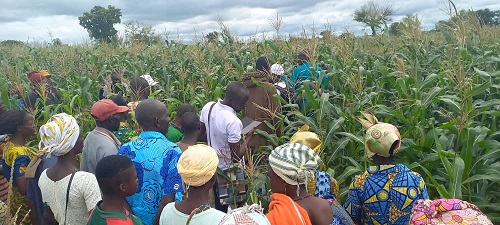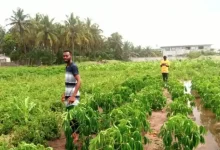
A lecturer of the Faculty of Agriculture of the University for Development Studies (UDS), Yankpala, Dr Osman Tahidu Damba, has asked farmers in the Upper East Region to adopt new technologies and crop varieties to lessen the impact of climate change which, according to him, has posed a serious threat to agricultural production.
In his view, the use of adapted crops and varieties were among the climate-smart practices for risk reduction, and, would aid reduce the dire effects of climate change on agricultural systems, to ensure farmers got good yields in every cropping season.
To ensure stable production, Dr Damba said there was the need for the rural farmer to show enthusiasm in new seeds which were introduced to them by some nonprofit organisations in agriculture and research institutions since the improved varieties were actually tried, tested and demonstrated in farmlands.
He brought these to the fore when researchers from an international research organisation, Accelerating Impacts of CGIAR Climate Research for Africa (AICCRA) Ghana, visited a maize farm in the Yidongo community, a suburb of Soe in the Bongo District of the Upper East Region.
Their one-day field day tour in the region formed part of a climate-smart project which the research organisation initiated to promote climate-smart activities in six select regions in the country.
“For instance, improved varieties in terms of drought, pest and maturing varieties were one of the climate-smart practices identified, and of course, as you can see here, we are currently demonstrating about four varieties, added to the farmer variety which makes it five varieties.”
The National Coordinator for AICCRA Ghana Project, Mustapha Alasan Daka, said the project would also promote maize-cowpea rotation to improve soil fertility and diversify income of smallholder farmers.
The Bongo District Director of the Department of Agriculture, Edgrah Drah, conducted the researchers through the demonstration plots, where three drought-resistant maize varieties (suhudoo, opeaburo and denbea) were sowed alongside a farmer hybrid (obatampa), an age-old variety cultivated by farmers in the Yidongo community.
A Senior Research Scientist at the Council for Scientific and Industrial Research (CSIR), Dr Stephen Yeboah, asked farmers here in Upper East to adapt climate resilient crops so as to enable them to get bumper harvest and quality commodities to attract good prices from the market.
According to him, AICCRA Ghana focused on two main crops-drought resistant maize and cowpea varieties, and the purpose of adopting those varieties was to increase the economic value of the land.
“As the maize is a heavy feeder, it takes more nutrients, and the cowpea replenishes with the natural source of nutrients”, replied Dr Yeboah, when queried why the concentration was on the two crops.
Meanwhile, some farmers in the community who spoke to the Ghanaian Times expressed their gratitude to AICCRA, Ghana for painstakingly taking them through the trials and demonstrations of the new improved varieties which, they said, suited the environment.
He called on government to endeavour to make the subsidised fertilisers more accessible to farmers in that part of the district, and indicated the introduction of the climate-smart varieties to farmers would be meaningless unless it was linked to the availability of fertilisers and other essential farm inputs.
The climate-smart project, executed under the auspices of AICCRA Ghana, is being implemented by the International Institute of Tropical Agriculture (IITA), with suppport from other partners; namely the Crop Research Institute of Council for Scientific and Industrial Research (CSIR-CRI), the Ministry of Food and Agriculture (MoFA), UDS, National Agricultural Research System (NARS)), among others.
FROM FRANCIS DABRE DABANG, BONGO-SOE






